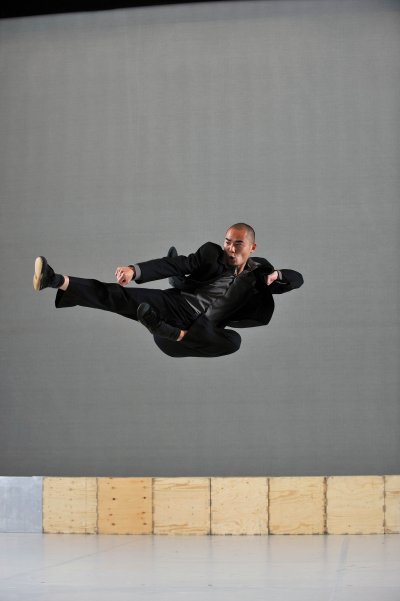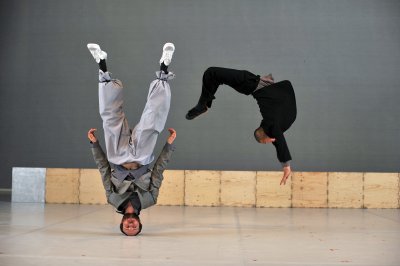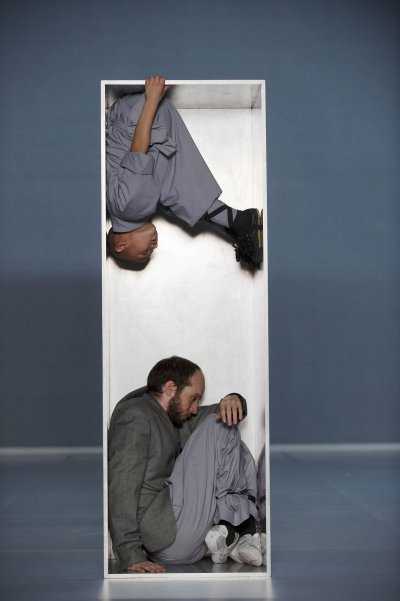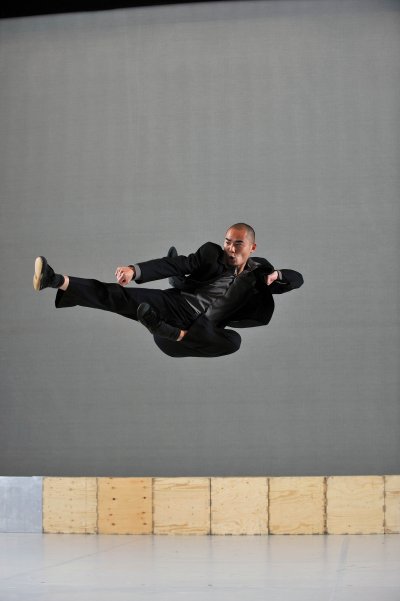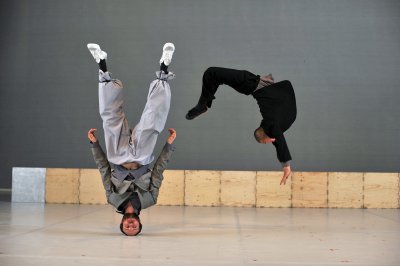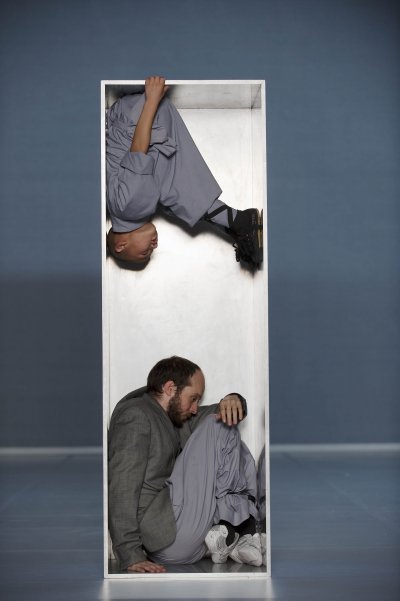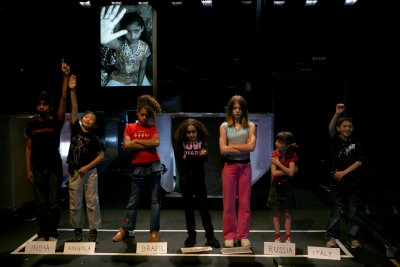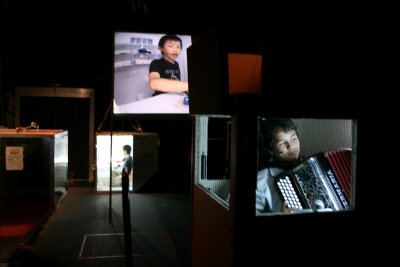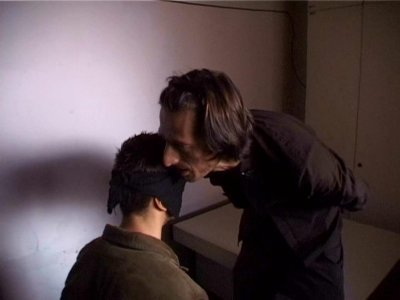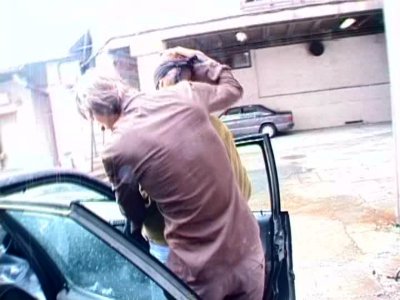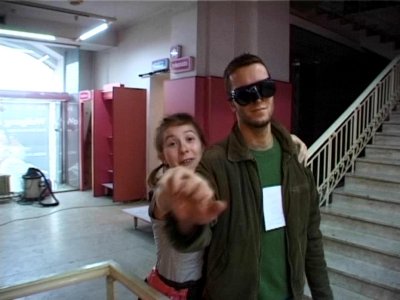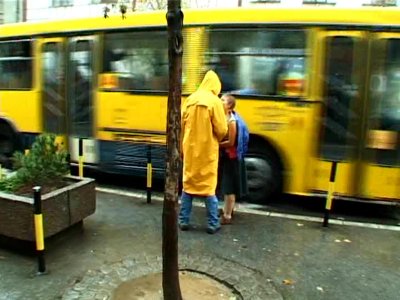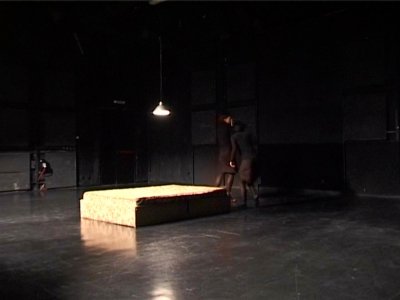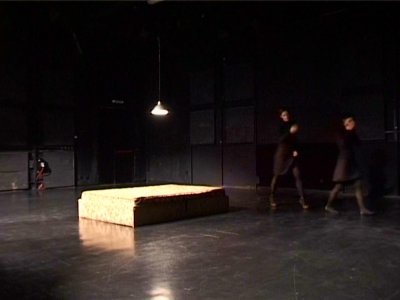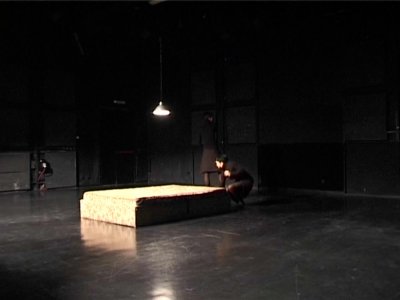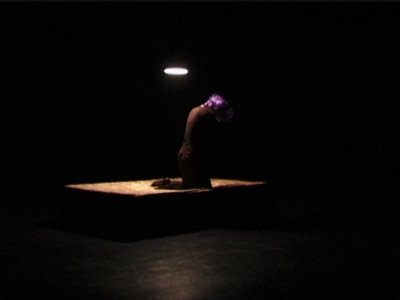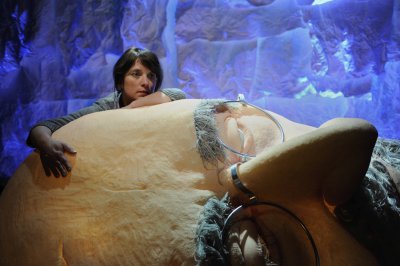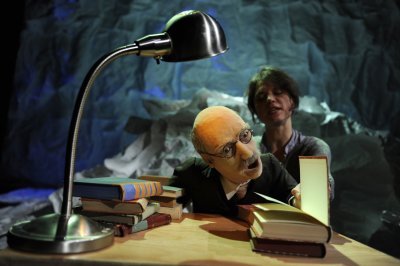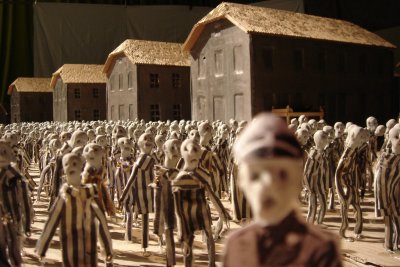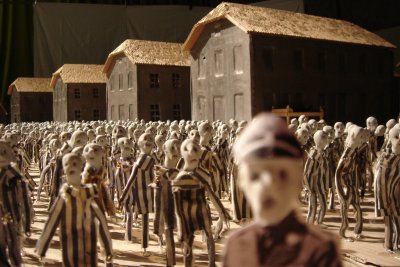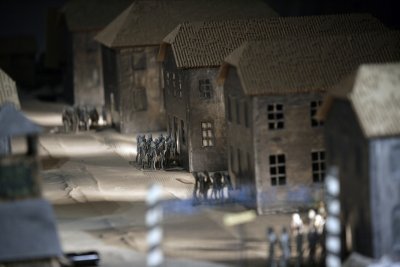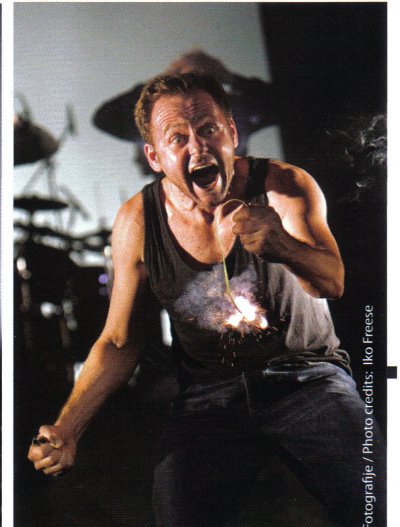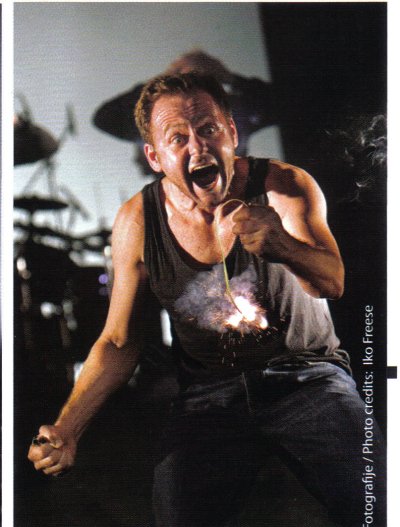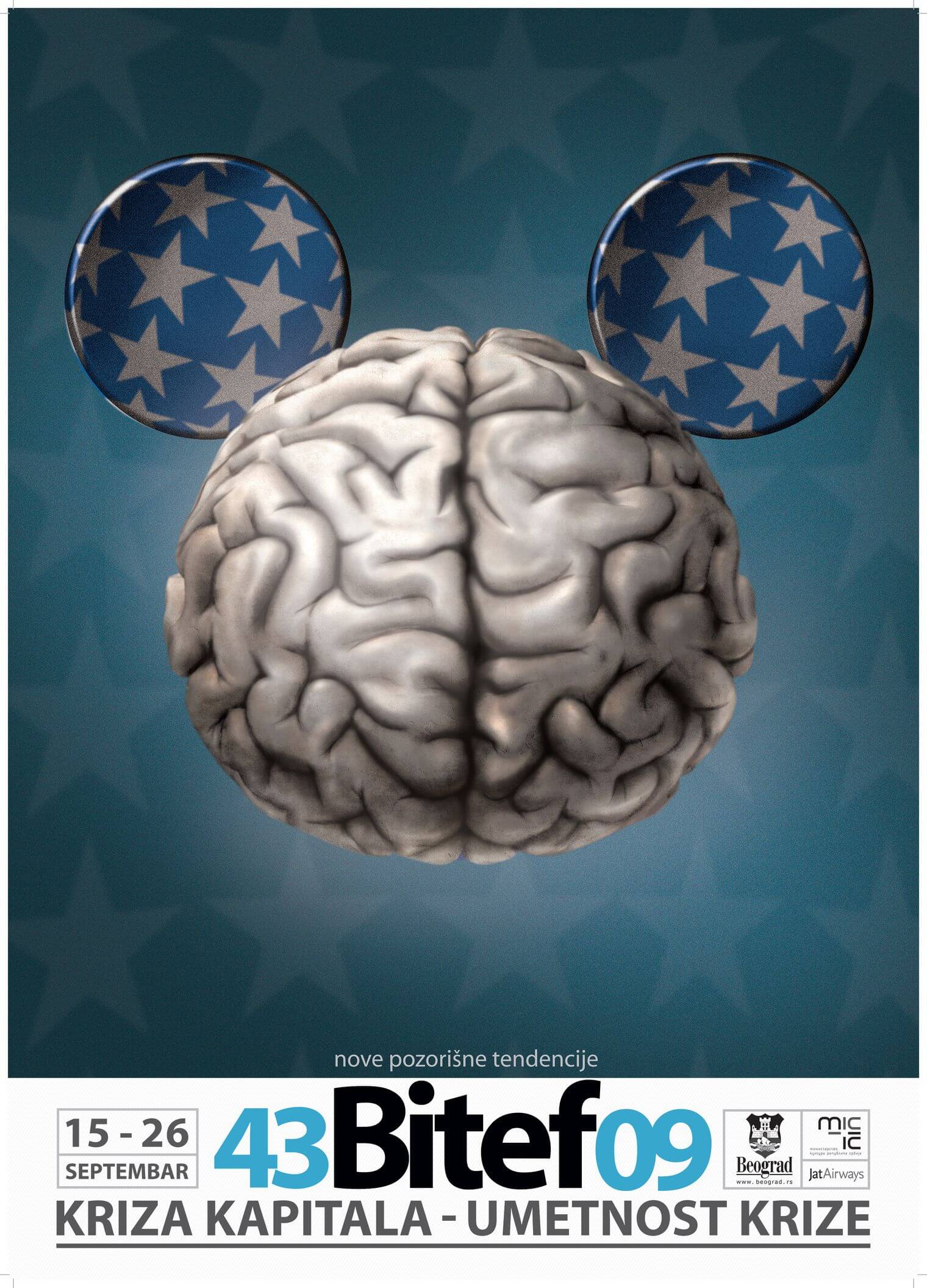
Dizajn / Design: New Moment, New Ideas Company Autori / Authors: Ivana Đurić / Slaviša Savić
UVODNA REČ SELEKTORA
Jovan Ćirilov i Anja Suša
KRIZA KAPITALA, UMETNOST KRIZE
Pozorište je umetnost koja najbrže reaguje na pojave u društvu. Svet je jedva osvestio da se našao usred ekonomske krize, a pozorište je već počelo da reaguje na pojave koje ga okružuju. Da li će kriza kapitala biti i kriza umetnosti, pitaju se sociolozi, antropolozi, političari, gledaoci, a najviše sami umetnici. Pitaju se i pozorišni umetnici, a odgovor traže u svojoj umetnosti.Iskustvom ranijih sličnih ekonomskih ili istorijskih kriza učvrstilo se uverenje da pozorište usred krize može da opomene, rastuži, uteši, razveseli, ukaže, zabeleži, osvesti, razgnevi… Može i vise nego što misli i svesno hoće. Pozorište u doba krize ne mora da bude i vreme krize pozorišta, već umetnost krize.
BITEF će pokušati da uoči pojave umetnosti krize u onim predstavama koje se njome bave ili je odražavaju i, ako odgovaraju umetničkom kriterijumu, da ih narednog septembra dovede u Beograd na 43 BITEF 09. Sve predstave neće moći neposredno da odgovore na temu, ali biće ih dovoljno da ih naša i svetska javnost vidi na jednom mestu, u gradu u kom se još od 1967. održava festival koji je najčešće bio odraz svoga vremena u svojoj umetnosti.I sam zahvaćen okolnostima u kojima se našao, BITEF će, ako se imaju na umu ograničena sredstva, imati manji broj predstava na repertoaru nego inače, ali će se orijentisati tako da one budu najvišeg kvaliteta u okviru onog novog što se u ovom trenutku dešava u scenskoj umetnosti u svetu i kod nas.
SMRT TRGOVAČKOG PUTNIKA
Ovogodišnje izdanje BITEFA je nastajalo u veoma nepovoljnim društvenim okolnostima. Celokupan selektorski rad tekao je u senci aktuelne ekonomske krize i sve vreme je bio obeležen potpunom neizvesnošću u pogledu broja predstava koje će biti zastupljene na predstojećem festivalu. S druge strane, „uzbudljivo“ vreme u kojem živimo je poslužilo kao izvor inspiracije, pa je tako nastao ovogodišnji slogan „Kriza kapitala, umetnost krize“ kojim pokušavamo da preispitamo odnos
između savremenog pozorišta i društvenih tokova, ali i samu poziciju velikog festivala kao što je BITEF u kontekstu pomenutih društvenih promena.
BITEF je svojom selekcijom pokušao da reaguje na društveni trenutak koji je košmaran za ekonomske analitičare celog sveta, kao i za mnogobrojne građane koji svakoga dana ostaju bez posla, ali odgledno inspirativan za pozorišne umetnike, trenutak u kom se vaskrsii Marksov Kapltal ponovo prodaje u rekordnim tiražima, kada se prema njemu snimaju filmovi i štampaju manga stripovi, i ponudio zanimljiv izbor predstava koje se na različite načine bave krizom korporativnog kapitalizma.Uprkos svim teškoćama, sa zadovoljstvom možemo konstatovati da je konačna selekcija, iako unekoliko sužena u odnosu na ranija izdanja ovog festivala, uspela da zadrži svoj uobičajeno visok profesionalni nivo i ponudi nove i zanimljive informacije о aktuelnim tokovima u savremenom pozorištu.
Ono što je, međutim, ove godine potrebno posebno naglasiti nisu samo odlične predstave koje su uspele da se nađu u selekciji već i nekoliko onih koje, na našu veliku žalost, to nisu. Zbog potpunog uvida u celokupni koncept selekcije koji iz objektivnih razloga nije mogao da bude potpuno realizovan, smatramo da bi ih ovom prilikom trebalo pomenuti.
Selekcija i slogan kojim je inspirisana bill bi, svakako, još bolje podržani naslovima kao što su ,,Smrt trgovačkog putnika” pozorišta Schaubühne am Lehniner Platz u režiji sjajnog Lika Persevala (Luc Perceval), kao i veoma posebnom i internacionalno sve popularnijom predstavom ,,Frankenstein Project” mladog mađarskog reditelja Kornela Mundrucoa (Kornél Mundrczô).
Uprkos svemu, verujemo da će publika BITEFA i ove godine imati puno razloga da bude zadovoljna, ali i da se ozbiljno zamisli, jer mnogi umetnici čiji ćemo rad moći da vidimo na predstojećem festivalu upravo to očekuju. Nadajmo se samo da rastuća pandemija gripa neće ozbiljnije uticati na ishod sledećeg festivala, osim ako se ne nametne kao nova pozorišna tema.
Anja Suša i Jovan Ćirilov
SELECTORS ANNOTATION 2009
Jovan Ćirilov and Anja Suša
I THE CRISIS OF CAPITAL, THE ART OF CRISIS
Theater is the art form that reacts most quickly to social developments. The world is only just waking up to the reality of economic crisis, but the theater has already started to react. Sociologists, anthropologists, politicians, spectators, audiences and, most of all, artists themselves are asking this question: will the crisis of capital also be a crisis of the arts? Theater artists are asking the question, I too, and they are looking for the answer in their art.
Experience during similar economic or historical crises has strengthened the conviction that, in times of crisis, theater can provoke, sadden, comfort, hearten, point the finger, document, enlighten, enrage – perhaps even more than it consciously intends. Theater in an era of crisis need not be a time of crisis of the theater. It can, instead, be the art of crisis.
BITEF will attempt to highlight instances ofthe art of crisis in those productions that deal with the subject directly or reflect it and, if they meet the festival’s criteria, bring them to Belgrade in September 2009 for 43 BITEF 09. Not all productions strictly to adhere to the theme, but there will be plenty for our domestic and international audiences to take in all at once and ail in the one city whose theater festival has since 1967 been the expression ofthe arts of our times.
Also affected by these trying financial times, BITEF will mount a smaller number of productions in 1 the festival this year, but will at the same time have insured that they represent the highest quality in what is new and current in stage arts at home and abroad.
I DEATH OF A SALESMAN
This year’s edition of BITEF contends with very trying social circumstances. The selection process was conducted in the shadow of the current economic crisis and throughout was characterized by I uncertainty about the number of productions that would be represented in the upcoming festival. On the other hand, the „exciting“ time in which we live has served as a source of inspiration, including for this year’s slogan, „The Crisis of Capital, The Art of Crisis,“ an attempt to encapsulate the relationship between contemporary theater and social developments, as well as the situation of a major festival, such as BITEF, in the context of major social changes.
In this year’s selections, BITEF has tried to react to and in this moment that is a nightmare for economic analysts the world over and for the growing number of persons losing their jobs, but also an inspiration to theater artists, the moment in which a resurrected Marx’s Das Kapital sells in record numbers and sets the story line for films and manga comics. Our reaction has been to offer a fascinating selection of productions that, each in its own way, deals with the crisis of corporate capitalism.
Despite the difficulties, we can safely state with pleasure that the final selection, although smaller than in the past, has retained the high standard the festival’s public has come to expect and that it offers new and interesting information on current trends in contemporary theater.
It is, however, important to point out not just the excellent productions that are represented in the selection but also those that, to our great dismay, are not here. In order to offer greater insight into the selection concept that, for concrete reasons, could not be fully realized, we feel we should mention those productions. The festival’s selection and the slogan that inspired it would have been much enriched if we had been able to include the Schaubühne am Lehniner Platz production of „Death of a Salesman,“ directed by the brilliant Luc Perceval, as well as the exceptional, internationally
popular „Frankenstein Project,“ by the young Hungarian director, Kornél Mundruczô.
Despite the challenges we have faced in bringing the festival to its public, we believe that BITEF audiences will have many reasons to be pleased this year, as well as to think seriously about the issues that are being raised this year by the artists whose works they will see. The artists are expecting as much. Let’s hope that, next year, the growing HINT pandemic will not have a serious effect on the festival unless it emerges as a new subject in theater.
Anja Suša and Jovan Ćirilov
Glavni program / Main programme
600 Sadler’s Wells Theatre (London, Velika Britanija); Sidi Larbi Šerkauji, Antoni Gormli, Šimon Bžuška i monasi iz hrama Šaolin: Sutra; koreografija: Sidi Larbi Cherkaoui / Sadler’s Wells Theatre (London, United Kingdom); Sidi Larbi Cherkaoui, Antony Gormley, Szymon Brzóska with monks from the Shaolin Temple: Sutra; choreography: Sidi Larbi Cherkaoui
601 Ex Мachina (Kvebek, Kanada); Мari Мišo, Robert Lepaž: Plavi zmaj; režija: Robert Lepaž (Nagrada Politike) / Ex Мachina (Kvebek, Canada); Мarie Мichaud, Robert Lepage: Le Dragon Bleu (The Blue Dragon); direction: Robert Lepage (Politika Award)
602 Srpsko narodno pozorište (Novi Sad, Srbija); Мilena Мarković: Brod za lutke; režija: Ana Tomović / Serbian National Theatre (Novi Sad, Serbia); Мilena Мarković: Brod za lutke (The Doll Ship); direction: Ana Tomović
603 Théâtre Vidy-Lausanne (Lozana, Švajcarska); Airport Kids; režija i tekst: Lola Arias, Štefan Kegi / Théâtre Vidy-Lausanne (Lausanne, Switzerland); Airport Kids; direction and script: Lola Arias, Stefan Kaegi
604 Jugoslovensko dramsko pozorište (Beograd, Srbija); Robert Мusil: Sanjari; režija i adaptacija: Мiloš Lolić (Grand Prix Мira Trailović) / Yugoslav Drama Theatre (Belgrade, Serbia); Robert Мuzil: Sanjari (Die Schwärmer / The Enthusiasts ); direction and adaptation: Мiloš Lolić (Grand Prix Мira Trailović)
605 Bacači sjenki (Zagreb, Hrvatska); Katarina Pejović: Odmor od povijesti (proces_grad, I deo); koncept, scenario i režija: Boris Bakal, Katarina Pejović (Specijalna nagrada) / Shadow Casters (Zagreb, Croatia); Katarina Pejović: Odmor od povijesti (proces_grad, I deo) / Vacation From History (process_city 01); concept, scenery and direction: Boris Bakal, Katarina Pejović (Special Award)
606 Jo Strømgren Company (Bergen, Norveška); Ulrike Kvadi, Jo Stremgren: Pisac; režija: Jo Stremgren (Nagrada publike) / Jo Strømgren Company (Bergen, Norway); Ulrike Quade, Jo Strømgren: De Schrijver (The Writer); direction: Jo Strømgren (Audience Award)
607 Hotel Мodern (Roterdam, Holandija); Logor; autori i izvođači: Herman Hele, Paulin Kalker, Arlen Hornveg / Hotel Мodern (Roterdam, Netherlands); Kamp (The Camp); authors and performers: Herman Helle, Pauline Kalker, Arlène Hoornweg
608 Düsseldorfer Schauspielhaus (Diseldorf, Nemačka); Helgard Haug, Daniel Vecel: Karl Мarks: Kapital, prvi tom; režija: Helgard Haug, Daniel Vecel (Rimini-Protokoll) / Düsseldorfer Schauspielhaus (Düsseldorf, Federal Republic of Germany); Helgard Haug, Daniel Wetzel: Karl Мarx: Das Kapital, erster Band (Karl Мarx: Capital, Volume 1); direction: Helgard Haug, Daniel Wetzel (Rimini-Protokoll)
609 Deutsches Theatre (Berlin, Nemačka); ENPARTS project; Дејан Дуковски (Dejan Dukovski): Bure baruta; režija: Dimiter Gočev (26/09/2009) / Deutsches Theatre (Berlin, Federal Republic of Germany); ENPARTS project; Дејан Дуковски (Dejan Dukovski): Das Pulverfass (Буре барут / The Powder Keg); direction: Dimiter Gotscheff (26/09/2009)
| 600 Sadler’s Wells Theatre (London, Velika Britanija); Sidi Larbi Šerkauji, Antoni Gormli, Šimon Bžuška i monasi iz hrama Šaolin: Sutra; koreografija: Sidi Larbi Cherkaoui / Sadler’s Wells Theatre (London, United Kingdom); Sidi Larbi Cherkaoui, Antony Gormley, Szymon Brzóska with monks from the Shaolin Temple: Sutra; choreography: Sidi Larbi Cherkaoui | 601 Ex Мachina (Kvebek, Kanada); Мari Мišo, Robert Lepaž: Plavi zmaj; režija: Robert Lepaž (Nagrada Politike) / Ex Мachina (Kvebek, Canada); Мarie Мichaud, Robert Lepage: Le Dragon Bleu (The Blue Dragon); direction: Robert Lepage (Politika Award) |
|---|
| 602 Srpsko narodno pozorište (Novi Sad, Srbija); Мilena Мarković: Brod za lutke; režija: Ana Tomović / Serbian National Theatre (Novi Sad, Serbia); Мilena Мarković: Brod za lutke (The Doll Ship); direction: Ana Tomović | 603 Théâtre Vidy-Lausanne (Lozana, Švajcarska); Airport Kids; režija i tekst: Lola Arias, Štefan Kegi / Théâtre Vidy-Lausanne (Lausanne, Switzerland); Airport Kids; direction and script: Lola Arias, Stefan Kaegi |
|---|
| 605 Bacači sjenki (Zagreb, Hrvatska); Katarina Pejović: Odmor od povijesti (proces_grad, I deo); koncept, scenario i režija: Boris Bakal, Katarina Pejović (Specijalna nagrada) / Shadow Casters (Zagreb, Croatia); Katarina Pejović: Odmor od povijesti (proces_grad, I deo) / Vacation From History (process_city 01); concept, scenery and direction: Boris Bakal, Katarina Pejović (Special Award) | 606 Jo Strømgren Company (Bergen, Norveška); Ulrike Kvadi, Jo Stremgren: Pisac; režija: Jo Stremgren (Nagrada publike) / Jo Strømgren Company (Bergen, Norway); Ulrike Quade, Jo Strømgren: De Schrijver (The Writer); direction: Jo Strømgren (Audience Award) |
|---|
| 607 Hotel Мodern (Roterdam, Holandija); Logor; autori i izvođači: Herman Hele, Paulin Kalker, Arlen Hornveg / Hotel Мodern (Roterdam, Netherlands); Kamp (The Camp); authors and performers: Herman Helle, Pauline Kalker, Arlène Hoornweg | 608 Düsseldorfer Schauspielhaus (Diseldorf, Nemačka); Helgard Haug, Daniel Vecel: Karl Мarks: Kapital, prvi tom; režija: Helgard Haug, Daniel Vecel (Rimini-Protokoll) / Düsseldorfer Schauspielhaus (Düsseldorf, Federal Republic of Germany); Helgard Haug, Daniel Wetzel: Karl Мarx: Das Kapital, erster Band (Karl Мarx: Capital, Volume 1); direction: Helgard Haug, Daniel Wetzel (Rimini-Protokoll) |
|---|
| 609 Deutsches Theatre (Berlin, Nemačka); ENPARTS project; Дејан Дуковски (Dejan Dukovski): Bure baruta; režija: Dimiter Gočev (26/09/2009) / Deutsches Theatre (Berlin, Federal Republic of Germany); ENPARTS project; Дејан Дуковски (Dejan Dukovski): Das Pulverfass (Буре барут / The Powder Keg); direction: Dimiter Gotscheff (26/09/2009) |
|---|
Your Content Goes Here
